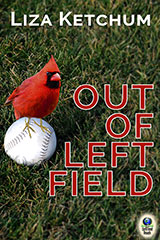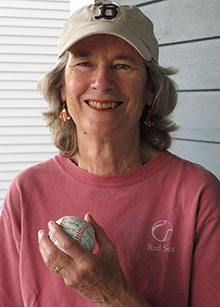
|
Out of Left Field
About the Book The summer of 2004 is full of promise for Brandon McGinnis. He has a job, a spot on the varsity swim team, loving parents, and loyal friends. Brandon and his dad, ardent Red Sox fans, wonder: could this be the year the Sox end their eighty-six year drought? Then Brandon’s father dies suddenly. A new will, signed just before his death, reveals a secret kept for thirty years. As shadows of the Vietnam War bleed into the escalating War in Iraq, Brandon sets out to solve the mystery his father left behind. His journey takes him to Canada’s Cape Breton Island, where he uncovers bittersweet truths about the past, and a family facing their own hidden demons. Brandon’s courageous search throws him into life’s game with its devastating losses, unexpected curve balls, and thrills as wondrous as a home run on an autumn night. Behind the Book FAQ: What inspired you to write this novel? My friend and teaching colleague, Jane Resh Thomas, tells her students, “Write what haunts you.” The Vietnam War, and the events surrounding it, have haunted me since 1968-69, when my cousin and a dear friend died in that conflict. I became politically active against the war during college and worked for anti-war candidates after graduation and in subsequent elections. Though the war has been over for decades, I never stopped thinking about it. I have visited Maya Lin’s beautiful memorial in Washington, D.C. many times. Lin’s polished granite wall honors the 58,000 American men and women who died in Vietnam. But I knew that thousands of young men who were opposed to the war fled the country and went to live in Canada. What happened to the war resisters—as they called themselves—after they crossed the border? What was it like for those who came home? I often write novels to explore questions I can’t answer. Out of Left Field is no exception. In 2004, when our government launched a second war in Iraq, I decided it was time to write this story. FAQ: Why Boston? And why baseball?
My husband and I have lived just outside Boston since 1994. I have enjoyed the game since 1960, when I ran home from school in time to see Bill Mazeroski hit the winning home run for the Pittsburgh Pirates. This was the first time I’d ever seen my mother watching television in the daytime, so I knew it was an important event. (My parents were from Pittsburgh, and my dad never gave up on the Pirates or his beloved Steelers.) Once I moved to Boston, I became an ardent Red Sox fan. Like so many in the Boston area, I was caught up in the excitement, anticipation, and joy of the 2004 season, when the Sox won their first World Series title in 86 years. The Iraq war cast a long shadow over that winning baseball season and provided me with complex background material for Brandon’s story. Following the Sox also gave Brandon something positive to hold onto as he mourned his father. From the moment I began the novel, I knew that baseball would be something he had shared with his dad. FAQ: Why did you set part of the story in Nova Scotia? Settings are like characters in my novels. If possible, I write about places that I know well or that I’ve visited. I try to bring these settings to life through accurate sensory details that include the natural world as well as the area’s architecture, culture, geology, weather, and atmosphere. My husband and I have visited Nova Scotia and beautiful Cape Breton Island many times. On one of our trips, we went on a whale watch, where we saw a rare right whale. The boat motored out of the same little town where Brandon meets Cat and Quinn for the first time. Baddeck, where Cat lives with her parents, is a town we know well from trips to visit dear friends. So the settings are real but the characters—as well as the whale watch boat—are invented. FAQ: How much of your story is true? How much is fiction? Though my characters are made up, the members of the Sox team are real, as are the details of the 2004 season. Our friend Jack Burrage helped me with baseball facts and loaned me a book that followed the team through all the ups and downs of that amazing season. He also referred me to a website that had a record of every game that year. I knew when the team was in town, when they were on the road, who pitched, who scored the winning runs, etc. The city of Boston went crazy during that time. Billboards on the Turnpike flashed encouraging messages for the team, the Prudential Building was lit up with red lights during the final games, and many residents walked around town with circles under their eyes after staying up half the night to watch the Yankee/Sox playoff games. But as far as I know, there’s no one like Tony (Brandon’s friend) in the ticket booth. While Brandon’s father is a fictional character, his journey to Canada, and the details of a war resister’s life in Toronto, are based on books that I read about the period. The book that Brandon’s father loves, Tim O’Brien’s The Things They Carried, is one of the most stunning and compelling books about the Vietnam War ever written. My copy is dog-eared from many readings. Readers who would like to know more about the period can consult the bibliography at the end of my novel. I hope that the medical details of the father’s disease are accurately portrayed. My husband, who is a physician, suggested the syndrome that kills the father and helped me immensely with that aspect of the story. |
 |
 |
 |
 |

